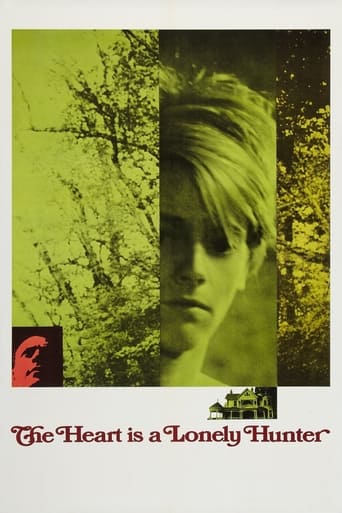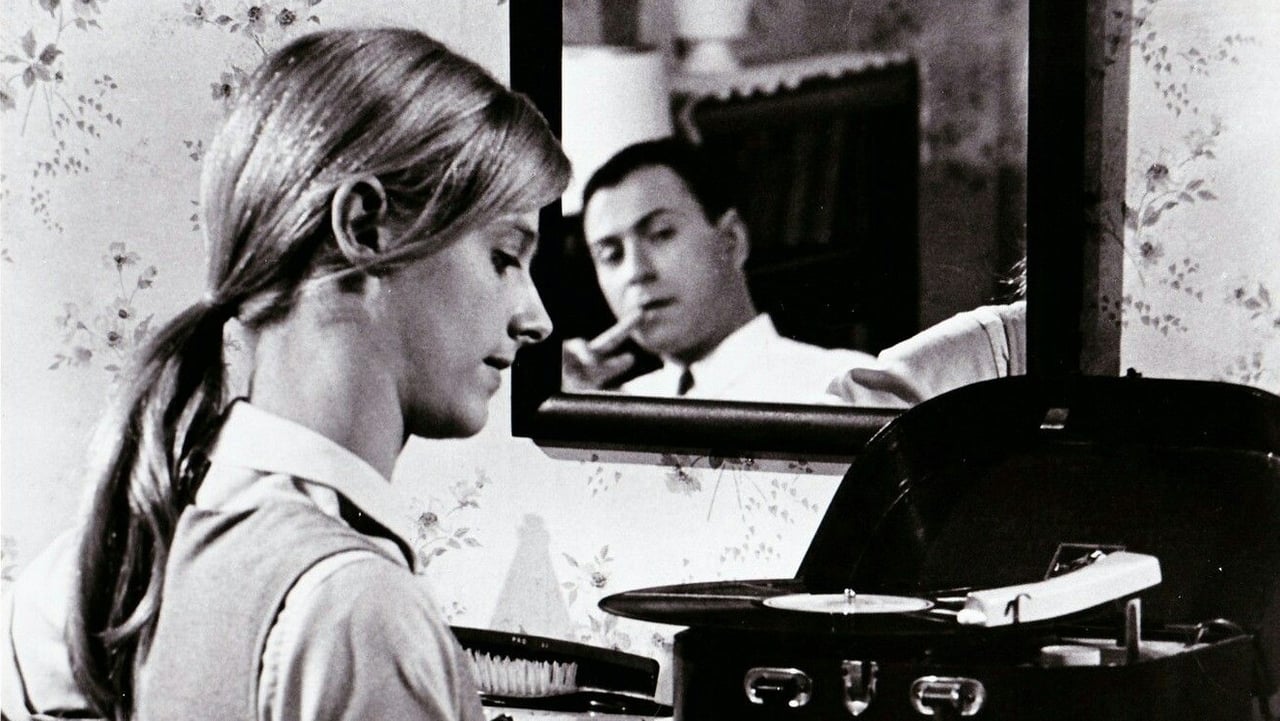robert-temple-1
I have just seen this wonderful film for the third time. For many years it was unavailable on DVD, and could only be obtained on a very old video tape of 1985, which I have. This film and THE MEMBER OF THE WEDDING (1952) are the two great classic films based on novels by Carson McCullers (1917-1967), whose tales were set in her native state of Georgia in America's Deep South, and are drawn from her early experiences. Carson McCullers was a far greater writer than the Deep South writer Harper Lee (born 1928), of whom so much more fuss is made. This film is a heart-rending study of the loneliness and desperation experienced by several people simultaneously, whose private sufferings are largely unknown to and unappreciated by the others, in a small Southern town, even though they all know one another. The lead character is Mr. Singer, a young deaf mute man played by Alan Arkin with such astonishing brilliance that it goes way beyond Oscar calibre and is probably the finest thing he has ever done. The other lead character is the young girl 'Mick', a lonely and poverty-stricken tomboy waif aged about 16, played in her first film role by Sondra Locke, then surprisingly aged 23 but not looking it, and whose Tennessee upbringing enabled her to speak like a convincing Southerner. Her performance is also spine-tingling in its pathos, and she proved herself overnight in her debut to be a major screen actress. Locke however later became famous for other reasons. In 1975 she moved in with Clint Eastwood and lived with him for 13 years, starring in six films with him. The story of their spectacular bust-up and the three lawsuits which arose from it are extremely tragic. It is impossible not to sympathise with Locke in her struggle against Eastwood, who appears to have been what is called 'a control freak', and the Hollywood Establishment. The details of all this sad saga, sadder even than a Carson McCullers novel, are widely known. Perhaps only McCullers could have done it justice in a fiction format, and expressed what the unfortunate Locke must have gone through. If there is a moral to the story, perhaps it is that girls from Shelbyville, Tennessee, had better watch their backs when they go to Hollywood, as no good can come of it. She did survive to direct four films and recover from breast cancer, but was shunned by many people who did not want to alienate Clint. As for the other performances in this film, they are all spectacularly good. The most impressive of all is probably that by Chuck McCann in his first feature film (he now has 151 acting credits) as Spiros Antonapoulos, a Greek immigrant (and there were many of them across the South in those postwar days who came over because of the Greek civil war, like the Syrian emigrants to Europe of today) who suffers from a strange and extreme form of autism whereby he has constant euphoria, compulsive eating habits, and total oblivion of his surroundings except for his one pal, Arkin. Arkin has spent years looking after him and has become his legal guardian, and in his own loneliness he has taken on McCann's as well, and they have become two lonely peas in a pod. But a tragic ending is inevitable, due to McCann's uncontrollable behaviour and his need to be institutionalised. All of these dramas are playing out without the knowledge of any of the other characters with whom Arkin interacts. He befriends an embittered black doctor in the Georgia town's 'bucktown' who hates all white people, played by Percy Rodrigues, and whose impassioned and rebellious daughter is played by Cicely Tyson. Rodrigues and Tyson are both explosive screen presences as well. The film is so packed with performances which are way off the scale in terms of talent that it is a real showcase for acting at the highest level. Thomas C. Ryan, who only scripted two other films, wrote a magnificent screenplay. He had written two scripts in the two preceding years, he then also produced this film, and then he mysteriously vanished from the film business. There must be a story there. He died in 1986. Apparently he assisted Otto Preminger when younger and came from Minnesota. That's all I know. Minnesota is a cold place, so maybe he got cold feet. This film was directed by Robert Ellis Miller, who later directed REUBEN, REUBEN (1983, see my review), who had spent 8 years directing for television before breaking into features two years earlier. This film is probably the crowning achievement of his entire career. It is so sensitively directed that Miller proved his higher abilities, if failing to achieve the higher status to which his talent alone should have entitled him in a just world. Sometimes in life, if you make only one great film, whereas your others have been good but did not set the world on fire, you have still succeeded at accomplishing what everybody else wishes they could do but never pulled off. Miller retired from directing in 1996 with 56 directing credits. If he will be remembered in the halls of fame, it will be for this early masterpiece. My advice to the unwary is, however, be ready to cry. But the ultimate point of this film is what is teaches us about human kindness and compassion. Mr. Singer, an obscure and ignored 'dummy' who communicates by holding out a card in his hand saying 'I am a deaf mute', becomes a hero of immense stature, not only in the story, but to all of us, because of what he gives to others, while having nothing for himself. He even buys a gramophone and plays classical music in his rented room so that Mick can overhear it, though unable to hear it himself.
evening1
I have always been curious about this film but found myself disappointed by how much seemed to be left out of the story.Why did the Arkin character find it necessary to pretend he was a deaf-mute? I know he wanted to become Spiros's guardian, but this extreme tactic did not seem to follow. And how was it that this small-town jewelry fixer no longer had to earn a living? Nor was it clear what happened to the gluttonous Spiros. Had he died of a broken heart when Singer tossed the chocolates out of the car? And was that what triggered Singer's out-of-the-blue suicide? Arkin played Singer beautifully. What a handsome, understated performance. Yet I found myself angry at his character for killing himself in his rented room, leaving a vulnerable teenage girl to discover the carnage. Singer had shown the utmost in sensitivity and empathy elsewhere in the film and his violent demise shattered that for me.I also found the subplot about southern racism and a father-daughter rivalry to be tiresomely one-note. Too much time was given to all this, with very little payoff.This movie kept my interest, but it sure seems like one story best enjoyed in its book form.
mwriter-2
You can read the many fine comments already made to appreciate why this is a superb movie that simply deserves to be seen. If you appreciate the story and want to see how actors and directors and the rest of the cast that make a film are there to tell the story, this is a good choice.It is evidence that Hollywood can make significant art, brilliant storytelling, and impacting entertainment.Alan Arkin and the whole film delivered. I saw this movie on an afternoon by chance on AMC or TCM and have never forgotten it. I might never forget this film.
Robert Vermeers (RVEMEERS5752)
Reading the book is giving me an incredible introduction to the substance of the story. I am seeing some profound insights to individuals that gives understanding to people I know. Especially religious people are portrayed so I understand the religious mind so much better. One element of the movie that is missing in the reviews I've read so far is the musical score. Composed by Dave Grusin the theme sends a chill into my psyche when I hear it years after viewing the movie. Mick seems to be a surprisingly deep person; considering her environment. Her love of classical music exposes a mind that rises well above her simple life. This is the nature of genius and is probably part of Carson McCuller's own persona. I would believe she writes from memories of her own childhood.


 AD
AD

